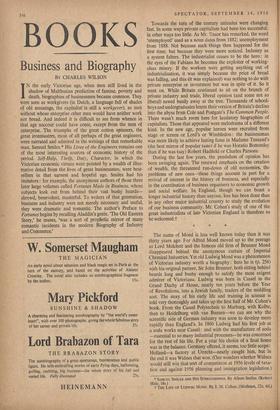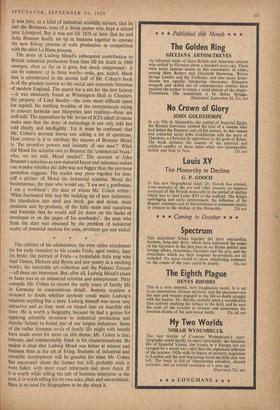BOOKS
Business and Biography
BY CHARLES WILSON IN the early Victorian age, when men still lived in the shadow of Malthusian prediction of famine, poverty and death, biographies of businessmen became common. They were seen as workgivers (in Dutch, a language full of shades of old meanings, the capitalist is still a werkgever), as men without whose enterprise other men would have neither work nor bread. And indeed it is difficult to see from whence in that age succour could have come, except from the men of enterprise. The triumphs of the great cotton spinners, the great ironmasters, most of all perhaps of the great engineers, were narrated and admired in the writings of that remarkable man, Samuel Smiles.* His Lives of the Engineers remains one of the most interesting sources of economic history of the period. Self-Help, Thrift, Duty, Character, in which the Victorian economic virtues were pointed by a wealth of illus- trative detail from the lives of great businessmen, were best- sellers in that earnest and hopeful age. Smiles had his imitators : for example, the anonymous authors of those three later large volumes called Fortunes Made in Business, whose subjects look out from behind their vast bushy beards— shrewd, benevolent, masterful. To writers of that generation, business and industry were not merely necessary and useful, they were dramatic and romantic. The author's Preface to Fortunes begins by recalling Aladdin's genie. 'The Old Eastern Story,' he muses, 'was a sort of prophetic mirror of many romantic incidents in the modern Biography of Industry and Commerce.' Towards the turn of the century attitudes were changing fast. In some ways private capitalism had been too successful; in other ways too little. As Mr. Ensor has remarked, the word `unemployed' used as a noun dates from 1882; unemployment from 1888. Not because such things then happened for the first time; but because they were more noticed. Industry as a system falters. The industrialist ceases to be the hero: in the eyes of the Fabians he becomes the exploiter of working- class misery. If the workers were getting anything out of industrialisation, it was simply because the price of bread was falling, and this (it was explained) was nothing to do with private enterprise or investment but was in spite of it. So it went on. While Britain continued to sit on the branch of private industry and trade, liberal opinion (and some not so liberal) sawed busily away at the tree. Thousands of school- boys and undergraduates learnt their version of Britain's decline into the abyss from Cole and Postgate's The Conunon People. There wasn't much room here for laudatory biographies of capitalists. Those that appeared were melodrama of a different kind. In the new age, popular heroes were recruited from stage or screen or Lord's or Wimbledon : the businessman was more likely to achieve lasting fame in Madame Tussaud's (the best mirror of popular taste) if he was Horatio Bottomley than if he was (say) Robert Hadfield or Charles Parsons.
During the last few years, the pendulum of opinion has been swinging again. The renewed emphasis on the creation of wealth, the threatened run-down of old economies, the problems of new ones—these things account in part for a revival of interest in the history of business, and especially in the contribution of business organisers to economic growth and social welfare. In England, though we can boast a longer industrial history than anyone, less has been done than in any other major industrial country to study the evolution of our business community. Mr. Cohen's study of one of the great industrialists of late Victorian England is therefore to be welcomed. t
*
The name of Mond is less well known today than it was thirty years ago. For Alfred Mond moved up to the peerage as Lord Melchett and the famous old firm of Brunner Mond disappeared behind the anonymous curtain of Imperial Chemical Industries. Yet old Ludwig Mond was a phenomenon of Victorian industry worth a biography : here he is (p. 256) with his original partner, Sir John Brunner, both sitting behind beards long and bushy enough to satisfy the most exigent admirer of Victoriana. Ludwig was born in Cassel in the Grand Duchy of Hesse, nearly ten years before the Year of Revolutions, into a Jewish family, traders of the middling sort. The story of his early life and training in science is told very thoroughly and takes up the first half of Mr. Cohen's book. From the Cassel Polytechnic to Marburg, with Kolbe, then to Heidelburg with van Bunsen—we can see why the scientific side of German industry was soon to develop more rapidly than England's. In 1860 Ludwig had his first job at a soda works near Cassel : and with the manufacture of soda —essential to so many industrial processes—he was concerned for the rest of his life. For a year his choice of a final home was in the balance. Germany offered, it seems, too little scope: Holland—a factory at Utrecht—nearly caught him, but in the end it was Widnes that won. (One wonders whether Widnes would still will that sort of competition at 1956 levels of taxa- tion and against 1956 planning and immigration legislation.) * SAMUEL SMILES AND His SURROUNDINGS. By Aileen Smiles. (Robert Hale, 18s.) t The LIFE OF LUDWIG MONO. By J. M. Cohen. (Methuen, 22s. 6d.) It was here, as a kind of industrial scientific adviser, that he met the Brunners, sons of a Swiss pastor who kept a school near Liverpool. But it was not till 1870 or later that he and John Brunner finally set up in business together to operate the new Solvay process of soda production in competition with the older Le Blanc process.
The story of Ludwig Mond's subsequent contribution to British industrial production from then till his death in 1909 emerges, clear as far as it goes, but much compressed : it can be summed up in three words—soda, gas, nickel. Much that is adumbrated in the second half of Mr. Cohen's book is of the greatest interest to the social and economic historian of modern England. The search for a site for the first factory —it was ultimately found at Winnington Hall in Cheshire, the property of Lord Stanley—the even more difficult quest for capital, the teething troubles of the entrepreneurs trying to convert formulae and blueprints into realities—these are well told. The appendices by Mr. Irvine of ICI's alkali division, make sure that the story of technology is not only told but told clearly and intelligibly. Yet it must be confessed that Mr. Cohen's account leaves one asking a lot of questions. How correct is it to attribute the success of Brunner Mond to 'the inventive powers and industry of one man'? What did Mond the scientist owe to Brunner the 'commercial brain.' who, we are told, Mond needed? The account of John Brunner's activities as raw-material buyer and salesman makes one wonder whether the debt was not bigger than the previous quotation suggests. The reader may piece together for him- self a picture of Mond the industrial scientist. Mond the businessman; the man who would say, 'I am not a gentleman, I am a workman' : the man of whom Mr. Cohen writes : 'What fascinated him was the building up of new industries. the translation into steel and brick, gas and steam, main products and by-products, of the little sums and equations and formulae that he would still jot down on the backs of envelopes or on the pages of his notebooks' : the man who from the start was obsessed by the problem of industrial waste, of potential markets for soda, producer gas and nickel.
The oddities of his adolescence; the even odder attachment (in his early twenties) to his cousin Frida, aged twelve, later his bride; the portrait of Frida—a formidable little prig who read Ossian, Dickens and Byron and saw poetry in a smelting works; the inevitable art collection and the Palazzo Zuccari —all these are important. But, after all, Ludwig Mond's claim to fame was as an industrial scientist and entrepreneur. Piety compels Mr. Cohen to record the early years of family life in Germany in conscientious detail : honesty requires a reviewer to doubt whether anybody could make Ludwig's relatives anything but a bore. Ludwig himself was never very attractive and as time went on turned into an irascible old , boor. He is worth a biography because he had a genius for applying scientific invention to industrial production and thereby helped to found one of our largest industries. Some of the rather tiresome trivia of family life might with benefit have made room for more on this theme. Mr. Cohen is fair, tolerant, and commendably frank in his characterisations. He makes it clear that Ludwig Mond was better at science and business than at the art of living. Students of industrial and scientific development will be grateful for what Mr. Cohen has uncovered about the former but will probably wish it were fuller, with more exact references and more dates. If it is worth while telling the tale of business enterprise in the past, it is worth telling for its own sake, plain and unvarnished; there is no need for biographers to be shy about it.



































 Previous page
Previous page